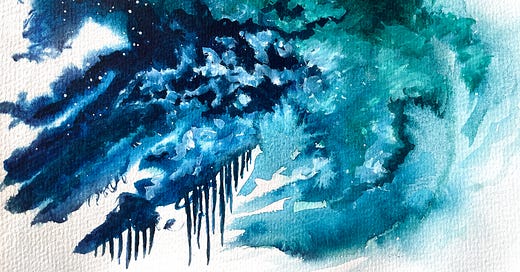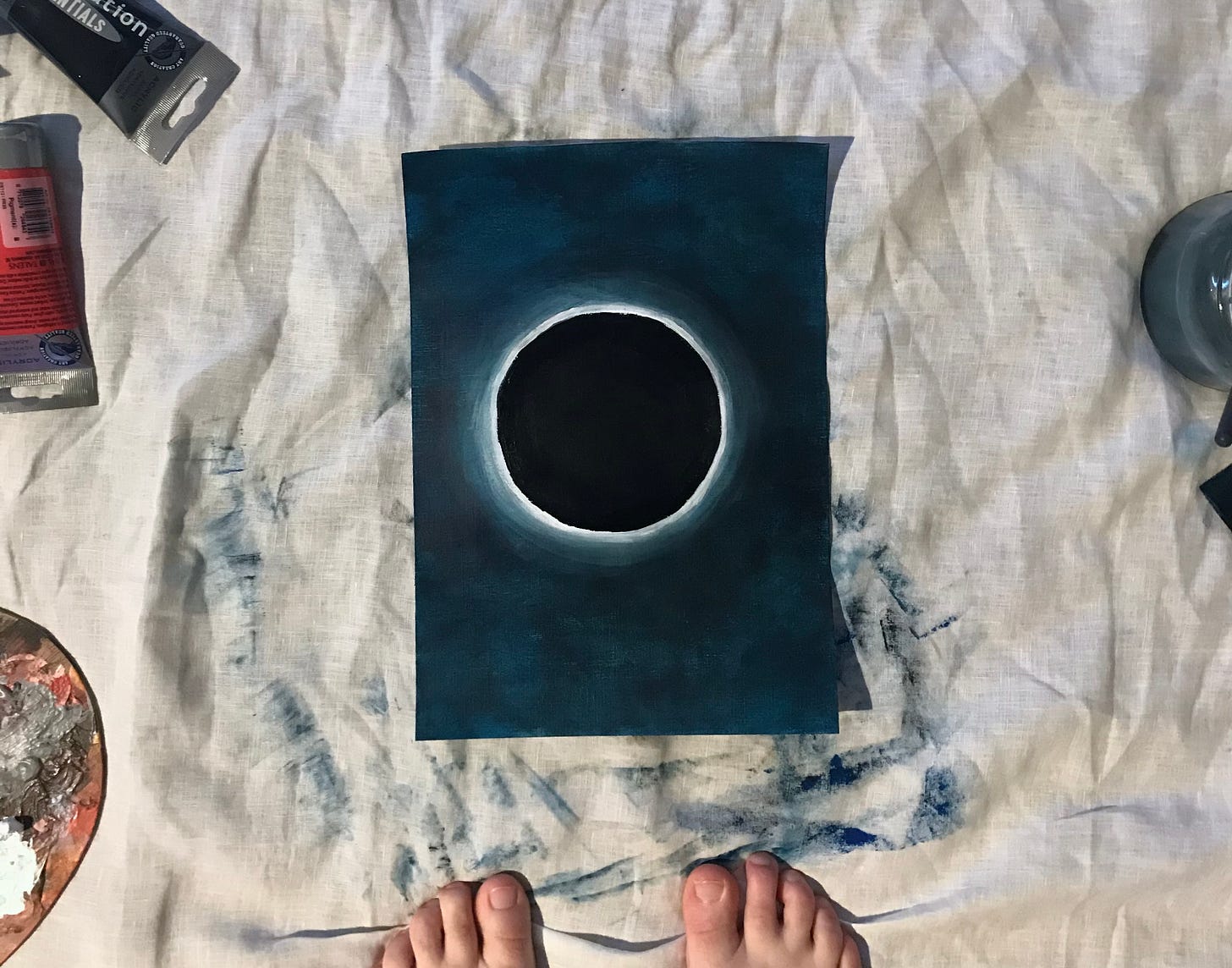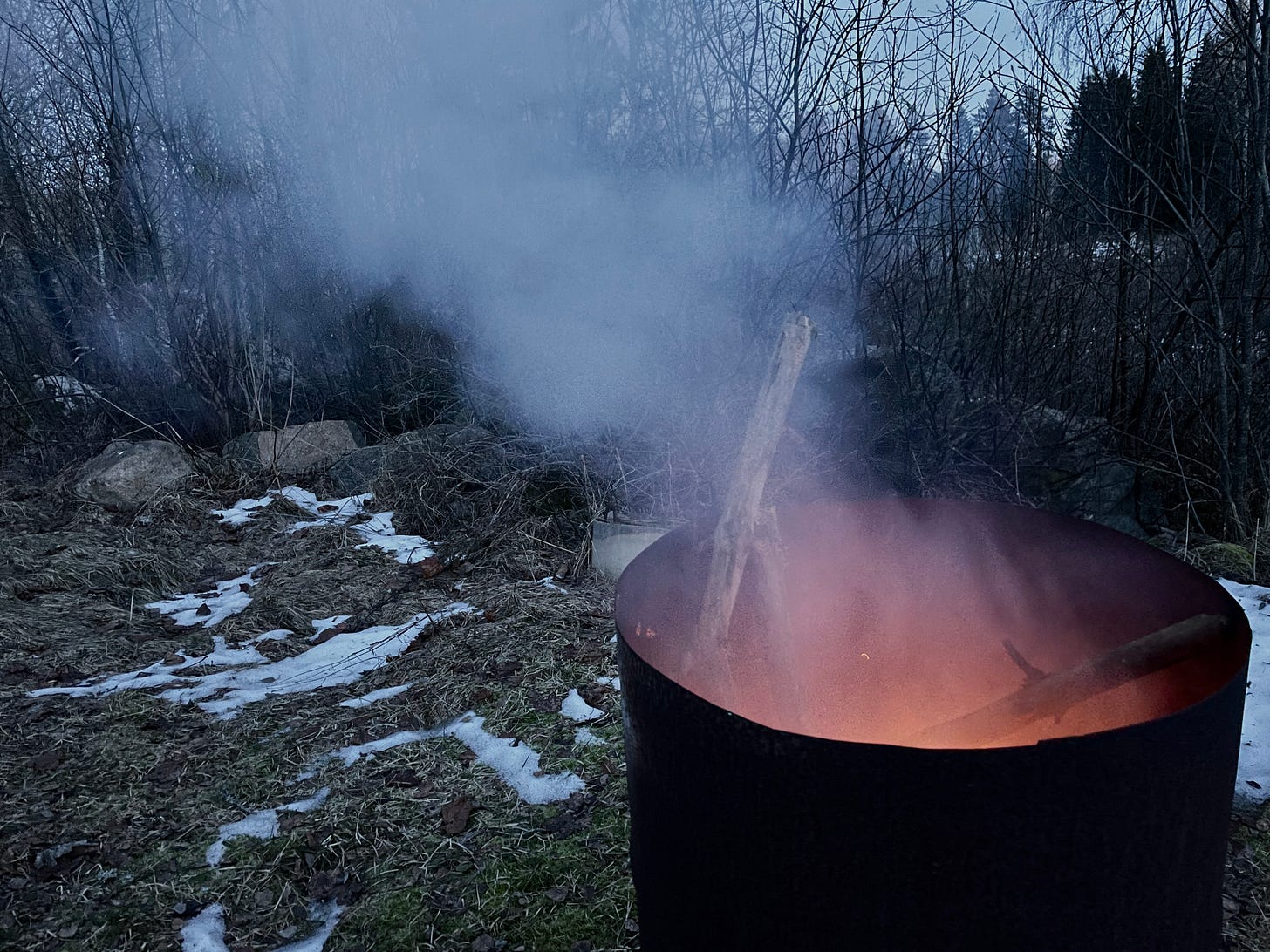The healing power of abstract painting
Weekly letter #32, on fire rituals, pain relief, and watercolor abstracts.
It was December 26th, 2019. The day of the solar eclipse. I was home alone, and decided, from out of the blue, to paint. Something I hadn't done in a long time because I didn't see the point of it, and I had been too busy anyways.
Maybe it was precisely because of that busyness that I was in the state I was in: chronically exhausted, de-motivated, and uninspired about my career as a freelance writer and web designer. Just a few months later, as the world would shut down due to a certain virus, I would go on sick leave for burnout.
But on this fateful day of the eclipse, I took out some old acrylic paints and brushes, found a pad of paper, and just went with it. No particular idea of what to paint, no reference photo, no "goal" in mind. Just an urgent need to put paint to paper. What came out was this:
And from that, my love affair with abstract painting started. I realized that there were other ways of making art than the ones I'd tried. You could actually just sit down and fly by the seat of your pants. Painting could feel wild and intuitive. The subject could be your imagination.
This way of making art felt completely different to the way I was used to doing things, the way I do everything in my life: with jaws clenched, and shoulders tense. With a detailed plan, and a need to “perform”.
Painting abstracts demanded the complete opposite approach. It became a therapeutic tool for me as I later started my process of recovery. It not only helped me heal (some of) my perfectionist tendencies, it helped me re-invent myself and start a whole new chapter of my life.
I quickly moved on from acrylics to watercolor, a medium I had only dabbled with previously. With little success of course, because watercolor, like abstracts, do not come naturally to the chronic control freak. Sitting down to paint something like a portrait or a landscape in watercolor, when you have no experience of the medium at all, feels kind of like flailing around in a dark room, trying to find the exit. Or trying to bake a cake with no recipe and no measuring cups. Very chaotic and frustrating.
Painting abstracts in watercolor though, was a whole different feeling. Free from the tyranny of trying to accurately portray reality, I fell madly in love with watercolor. I became obsessed. Suddenly I took risks, and surprised myself in my art practice. I sat for hours, in a meditative state. I filled my walls with color studies and brushwork experiments. And my stress and anxiety slowly decreased.
I can honestly say that watercolor, and in particular, abstract watercolor painting, completely turned my life around.
So it feels very nostalgic getting back to this type of painting now, two years later. I've been script writing and filming for my course this week, and have recorded most of the talking bits. What's left are the most fun parts - the exercise demonstrations. Next week, I'm going to be painting and filming all week. And I can't wait. 🥳 I'm so excited about getting to put this course out into the world soon. I want to introduce more people to watercolor in the same gentle and relaxing way that was so healing for me.
Tell me something: If you paint with watercolor, of have tried in the past, what felt the most most difficult and frustrating to you in the beginning? What made you quit, or maybe want to quit?
Other than working on the course, I'm working on spending more time around the house and outside. Getting away from my screens.
Even though we're just entering the coldest part of winter here, I'm starting to long for spring really bad. I didn't do anything in the garden last year, (like, not even pick a single strawberry) because I was so focused on getting my career up and running. All I wanted to do was paint and make videos. Besides, I thought that maybe gardening and growing vegetables wasn't my thing after all. But now, after a year without it, I'm starting to crave it. Not just the physical labor of it, but simply being outside and connecting to the season. Hearing the birds, feeling the wind on my face, getting my hands dirty. However much it pains me to be outdoors sometimes, especially when it's hot, I also don't feel well when I'm this much indoors.
Yesterday, I decided to celebrate Imbolc, also called "Disablot" in our Nordic tradition. It's the pagan holiday of the return of the light. I don't have any religious affiliation. I consider myself an eclectic. I've always practiced nature spirituality in some form though, and am the most inspired by Nordic and celtic traditions. I don't always "practice", but when I do, I try to keep it really simple and down to earth. So for this little ritual, I lit a fire in our backyard barrel, fed it some branches of a fallen tree, and stood there meditating on the season and what seeds I want to plant this year (actual and symbolic.)
It felt so wholesome to be out in the cold, in front of a warm fire, while the sun was setting. It might not sound like a big deal to most countryside folk, but for someone like me, who's grown up in suburbia and mostly lived in cities, it's a sensory experience with spiritual meaning.
You can practice this holiday indoors too, by lighting candles, meditating on the coming spring, and planting a seed of some kind. Might be a tomato seed, or it might be a little note with an intention for the coming year. No need for complicated ceremonies or spells. But nothing beats going outside if you want to connect to the earth and the season. I'm committing to spending much more time outdoors this year.
This weekend will probably be spent mostly indoors though, because it's getting colder. I'm taking my run on the basement treadmill. And tonight, I'll bake a cake and play Spirit Island with my partner. We've both become obsessed with this very difficult and complex, but highly addictive board game...
Wishing you a pleasant weekend. 🖤
With love,
These painting processes, by Daniel Novotny:
The way he paints abstract watercolors is so exciting to me. It almost looks more like acrylic or oil painting. All those sharp angles from the flat brush... The color vibrancy... Ugh, so inspired!
We're still watching The Last of Us, and it's still...good. But I have my pet peeves. The way the infected move looks comical to me. Like they're auditioning for So You Think You Can Dance. Not very creepy, which is a shame because the special effects make up in this show is spectacularly creepy.
This article is interesting to me, but not very surprising.
Although it puzzles me that cutting down trees full-time can feel so joyful, I get it. We are the happiest, and the least stressed, when we get to spend plenty of time outside and use our body. And we are the most stressed out and unhappy in high-pressure, low autonomy jobs mostly spent indoors.
Cal Newport discusses this article in one of his recent podcast episodes, and he points out that this doesn't necessarily require us to take a farming or forestry job in order to feel more fulfilled at work. It can simply mean nudging our current circumstances more in that direction. For me, even though so much of what I do is in front of a screen, I can find more ways of spending time outside, as well as infusing my work with even more meaning. Like allowing myself to write and talk about the topics that are important to me. And slowing down the pace of my work.
Not all of us have the freedom and ability to do this, of course. But it's worth striving for.
As for books, I finished Less is More: How Degrowth Will Save the World, by Jason Hickel over a week ago and forgot to write about it. This book was incredibly well-written and well-argued. It made me understand how astronomical the economic divides in the world really are, how endless growth is incompatible with reversing climate change, and what a post-capitalist economy could look like. Highly recommended.
I've also finished two books about the mind-body nature of chronic pain: Healing Back Pain, and The Mindbody Prescription, by Dr. John Sarno. These books changed everything for me. It's like I've gotten my old self back. I lift weights again, I run, I do my yoga, I can sit and stand and lie down, and I'm having much less trouble with my back, hips and shoulders. If you have chronic pain, put your skepticism aside and read these books. Trust me.
Continuing on the topic of chronic pain and its emotional roots: I can't recommend enough the podcast "The Cure for Chronic Pain" by Nicole Sachs. The name is cocky-sounding, I know, but she is an experienced therapist who have helped herself as well as countless others, and she explains things so well. Just listening to her calms my nervous system. Even though I don't have a lot of pain right now, I still have an anxious personality, a highly sensitive nervous system, and chronic perfectionism. If that sounds like you, you're going to love this podcast too. I recommend starting from the very beginning, where she tells her story.













I have been loving the slow return of light and birds in our suburban garden. It tells me spring is not too far. :)